| Reviews & Columns |
|
Reviews DVD TV on DVD Blu-ray 4K UHD International DVDs In Theaters Reviews by Studio Video Games Features Collector Series DVDs Easter Egg Database Interviews DVD Talk Radio Feature Articles Columns Anime Talk DVD Savant Horror DVDs The M.O.D. Squad Art House HD Talk Silent DVD
|
DVD Talk Forum |
|
|
| Resources |
|
DVD Price Search Customer Service #'s RCE Info Links |
|
Columns
|
|
|
Man in a Suitcase: Set 1
While it's always difficult to judge a series when only half of it is presented to you, Man in a Suitcase is an important piece of the puzzle for American fans of vintage ITC entertainments such as The Saint and Danger Man. Acorn Media (lovely, really) has released Man in a Suitcase: Set 1, a four-disc, 15-episode collection that represents the first-half of the one-off cult British private eye/espionage show starring moody, Method-y he-man, Richard Bradford. If you love those Lord Lew Grade ITC productions like The Prisoner, The Persuaders, or Space: 1999, and you weren't around in the summer of 1968 when Man in a Suitcase played briefly over here on the ABC Network, then you know how American fans of ITC have been clamoring for this series to come to DVD. Well, here it is―at least the first part of it―and it proves to be terrifically entertaining. Too bad Acorn couldn't have ported over some of the Region 2 goodies as extras for this bare-bones presentation.
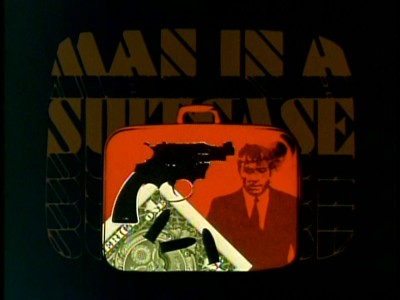
The set-up. McGill (Richard Bradford) works alone. A private investigator for hire, based out of London, rough 'n' tough McGill (no first name) used to be the third-highest ranking officer for U.S. Intelligence in England, until he discovered that one of the West's most important scientists was planning to defect to Communist Russia. Ordered by his superior, Harry Thyssen (John Barrie), to allow the scientist to turn traitor, McGill has no coverage with Washington when the defection becomes public, and Thyssen suddenly drowns. Disgraced and forced to resign, McGill is a now man without a country. Without a license to practice his trade in England (nor a permit for that gun), McGill walks a tightrope of insecurity with the police and the various intelligence communities that know he's vulnerable to coercion and blackmail, making him an ideal fall guy. Cynical and embittered about his position, McGill has only his U.S. passport, his gun, and a battered suitcase with his clothes (and a strange set of keys...) for protection against the constant beatings and assaults and double-crosses he encounters on his assignments all over Europe.
SPOILERS WARNING!
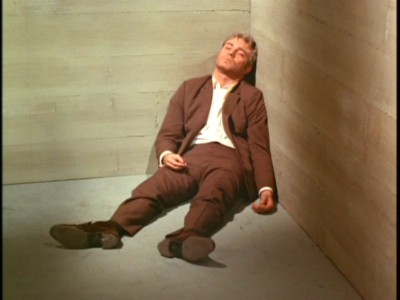
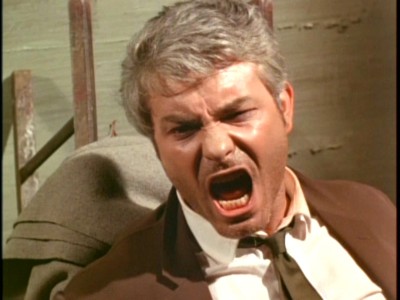
Being a huge fan of vintage British television in general, and ITC programming in particular, Man in a Suitcase has long been on my list of "lost" series that seemed to be readily available everywhere else but here in the States. Add to that its cult following and my own preference for these types of action/espionage works from this time period, and the announcement that Acorn Media was going to release Man in a Suitcase made it in my book one of the most anticipated releases of 2011. Of course the danger with that kind of years-long build-up is your own hyped expectations overshadowing the actual series. How many times have vintage TV fans waited and waited for a beloved title from their past to come out...only to sit there and wonder, with a growing sense of dread, what the hell they were so excited about in the first place?
Luckily, Man in a Suitcase more than satisfied my decades-long curiosity...with an important caveat, however: this set only gives me the first 15 episodes of the series (in their broadcast, not production, order). What I've seen so far plays very well―at least as well as some of the more routine Danger Man episodes, and above-par compared to some of the pokier Saint episodes (if you're like me, you love to rank these series). Comparisons with those far-better known series are inevitable, as well, since Man in a Suitcase was initiated with the exact same goal in mind: a British action-oriented series geared to appeal to international, and specifically, American, sponsors and networks (after all...that's where the big money used to be...). When Patrick McGoohan, tiring of the role of John Drake, informed Lew Grade that he was pulling out of the highly-rated Danger Man to create The Prisoner, a replacement series was immediately sought. Working off a concept by veteran writers/producers Dennis Spooner (The Avengers, The Baron, Doctor Who) and Richard Harris (The Saint, Armchair Mystery Theater), who, according to what I've read, apparently envisioned McGill as a more traditional noir tough-guy private dick, Man in a Suitcase evolved to include more topical espionage elements. Danger Man producer Sidney Cole was in charge (with some of the production crew carried over from McGoohan's series, as well, including editor and future Bond director John Glen ), and the search was on for a leading man to anchor the series―one who hopefully would appeal to the American networks. Apparently, Hawaii Five-O's Jack Lord was considered at one time, before Lew Grade saw the surly, vicious Richard Bradford in the hysterically-pitched Southern gothic, The Chase, starring one of Bradford's "Method" idols, Marlon Brando, and signed him on. 30 episodes were produced in 1966 and 1967, with Man in a Suitcase airing in the U.K. in the fall of '67 (to lukewarm response). Over here, Man in a Suitcase aired as a 1968 summer replacement for Howard Duff's Felony Squad and The Don Rickles Show on Friday nights at 8:30, but with repeats of Gomer Pyle, U.S.M.C. (3rd in the year-end Nielsen's) and The CBS Friday Night Movie (15th for the year) as direct competition, Man in a Suitcase didn't stand a chance, and loser ratings in the U.S. always meant one thing to Lew Grade: cancellation
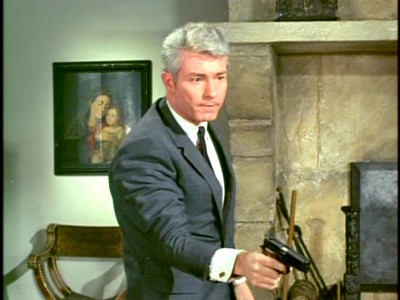
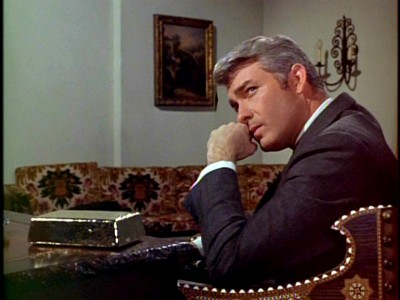
Watching Man in a Suitcase, the question that kept coming back to me was: why did Lew Grade and Sidney Cole pick Richard Bradford as their lead? Everything I've read indicates the choice was made after the producers saw Bradford in The Chase, an interesting fact because his turn in that overripe melodrama may hold part of the key as to why Man in a Suitcase is so fascinating...and why it also may not have appealed to a broader audience. We can discuss the plots and thematics of the series itself later, but since the series is titled Man in a Suitcase, with Bradford carrying the show (he appears in almost every scene), it's clear it will largely succeed or fail based upon his turn here. Anyone used to other ITC and vintage British television productions will immediately notice the difference in Bradford's approach to the role. Eschewing anything in his delivery, mannerisms, and body language that could remotely be construed as "polished" or "sophisticated" or "urbane," Bradford, an unapologetic advocate of "the Method," goes in the complete opposite direction. Keeping his head down often, and half-mumbling his lines sometimes, picking at objects and props around him in a preoccupied manner, Bradford's "realistic" approach, if you will, is entirely different than say, McGoohan's almost silkily perverse, amused tone, or Moore's ramrod-straight glamour. He's thoroughly...American in effect, with his breathy, hipster drawl and a surly, smart-assed impatience with the clipped English accents all around him that either conveys itself in supreme boredom with the swells who are bugging him...or sudden violence. It's a central lead performance unlike any other one you'll see from those similar series, and it's bracing as hell to watch. There's a nice, dangerous unpredictability to Bradford's manner that contrasts nicely with the otherwise civilized production, bursting forth with startling realism (for its time, of course) whenever the graphic violence is unleashed (purportedly, Bradford insisted on a level of authenticity with the fights and subsequent injuries to McGill―not at all unlike the still-impressively bloody beating Bradford administered to Brando in The Chase). McGill is either beaten up or shot in almost every episode, and Bradford is always careful to keep the results as realistic-looking as the copious amounts of blood on display.
However, as interesting as his performance is in both its physicality and inward, character-driven motivation, I can see why 1968 audiences, expecting perhaps a colorful British spy/private eye romp complete with brollies and bowler hats, might be nonplussed by Bradford's tense, closed-off performance. "Closed-off" doesn't usually work in television―unless, of course, the performer is charismatic or "large" enough in personality to keep our interest despite his suffering (the classic example of that would be the David Janssen in The Fugitive). Bradford, a fine actor, may be entertaining to watch, particularly in contrast to similar British shows of that period where polish and enunciation win out over brawn (think The Avengers' Patrick Macnee). But I would imagine his broodish, downcast personality didn't exactly "warm" the hearts of the average viewers who tuned into Man in a Suitcase when it first aired. Now don't get me wrong; I'm not saying Bradford should have wink winked to the audience to let them know he's really a charming guy after all. I like the gritty, downer aspects of the McGill character, a morose stance that fits in well with the-then evolution of the spy game into an existential nightmare of morally-compromised heroes and international playbooks with no rules (he could fit in nicely with le Carre or Deighton, or with the soon-to-come Callan). However, as good an actor as Bradford is technically (and he is very good), he's not a "star." He doesn't have that larger-than-life quality, that certain "X-factor" that would make audiences sit up and take notice of McGill, regardless of what he represented. And precisely because Bradford brings menace and thuggish energy to the McGill character without the star-quality pull of a Moore or a McGoohan or even a Mcnee, Man in a Suitcase is fascinating in its dichotomy: a glossy, expensive British action series designed to reach large international audiences, anchored by a lead performance that seems deliberately designed to if not alienate those very same viewers, then at least keep them at arms' length.
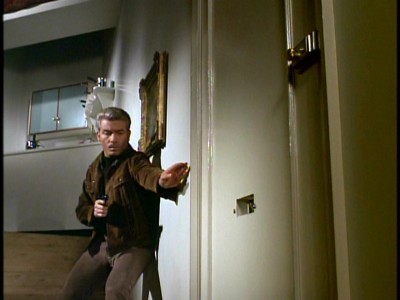
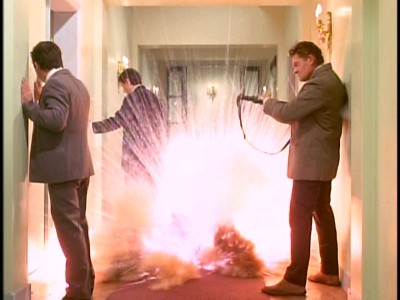
As for the plots and scripting and direction of Man in a Suitcase, it's again difficult to draw conclusions, as I wrote above, since I'm only seeing half of the entire series here. With the emphasis on either espionage or private eye stories ping-ponging back and forth from episode to episode, Man in a Suitcase stays interesting because just when we think McGill is turning into John Drake, he turns around and becomes Sam Spade. Brainwash, the action-filled, brutal episode that producers picked to be the first broadcast (even though episode 6, Man from the Dead is the actual pilot, filling in McGill's important back story) will no doubt remind spy enthusiasts of The IPCRESS File, because of its clever, vicious central sequence of brainwashing. Locked in a cinderblock cell, one wall becomes a giant screen where newsreels blare constantly, driving the weary McGill slowly insane (a gimmick the screenwriters, Francis Megahy and Bernie Cooper, and director Charles Crichton top, when they have McGill try to escape, only to encounter a funhouse "hall of mirrors," with screaming movie screens behind every door). The very next episode, though, right down to its noirish title, The Sitting Pigeon, is classic private eye stuff, with McGill hassled not only by the cops who threaten his livelihood should he pass on their "invitation" to baby-sit a squealing rat fink, but also the gangsters who wonder who this interloper into their affairs is, and why he won't die.
Day of Execution, featuring a good, weaselly performance by Donald Sutherland, shows us McGill's rather swank apartment (you don't see it again, maybe because it doesn't seem to fit in with his protestations of being poor), along with a cool night-time chase through the streets of London, and a spectacular escape for McGill via a well-place Molotov cocktail. Yoko Tani shows up as a big-time past love interest for McGill in the excellent two-parter, Variation on a Million Bucks (Anton Rodgers also scores as McGill's Russian agent friend). Man from the Dead explains away that McGill is really innocent of the charges brought against him six years before (too bad they didn't leave this facet of his character ambivalent; it would have been fun to guess throughout the series if McGill was bent or not). Any chance I can get to write that Judy Geeson drives me mad, I take. In Sweet Sue, a solid detective yarn with some good card-playing action, McGill offers protection to this mod little hottie, and she has a nice moment on the dance floor, swaying her body openly for Bradford to admire (she sold me). All That Glitters has that "small English village with sullen peasants and a secret to hide" feel that I love, and it's fun to see McGill so mercenary (he wants a bonus if he finds the missing kid alive). Dead Man's Shoes has a nice Avengers feel to it as a town is savaged by a drug cartel, all in the hopes of drawing back a double-crossing agent to his home town (one of my all-time favorites, Derren Nesbitt, isn't used nearly enough here). And Burden of Proof, starring another favorite of mine, Nicola Pagett (her mouth is like a perfectly formed strawberry), is a dense little espionage story that could have easily fitted in with McGoohan over at Danger Man, benefiting yet again from Bradford's physicality during the action sequences.
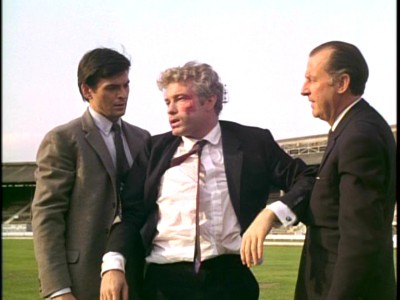
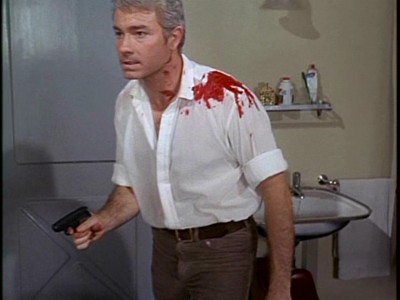
Here are the 15 episodes of the 4-disc set, Man in a Suitcase: Set 1, as described on their on-screen episode menus:
DISC ONE
Brainwash
A deposed African president is convinced that an Anglo-American plot drove him into exile. Furthermore, he believes McGill had a hand in the coup-and that the former agent can help restore him to power.
The Sitting Pigeon
Two crime family brothers are standing trial for murder-and only the testimony of a greedy third brother will assure conviction. McGill is blackmailed into making sure the man remains "healthy" until he can testify.
Day of Execution
Someone keeps threatening to kill McGill. At first it looks like a case of mistaken identity, but after an attack on one of his old college buddies, McGill raises his guard.
DISC TWO
Variation on a Million Bucks (Part One)
A former Soviet spy has a secret that puts him in mortal danger. He confides everything to his friend McGill, who soon finds himself pursued by Russians and Americans alike.
Variation on a Million Bucks (Part One)
McGill sets sail for Lisbon and runs afoul of some sailors on the voyage. Injured from the attack, he seeks help from a contact, but enemy agents are quickly closing in on his position.
Man from the Dead
A schoolteacher thinks she has just seen her father, even though he allegedly died six years ago. The woman quickly retracts her story, but McGill refuses to let the matter drop-the "dead" man might be able to clear his name.
Sweet Sue
The wild-child daughter of a wealthy tycoon is being ripped off by a pair of confidence men. Her father hires McGill to keep an eye on her-and to get rid of the men preying on her.
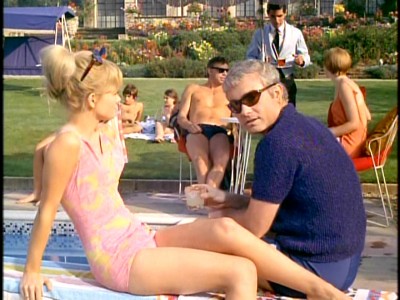
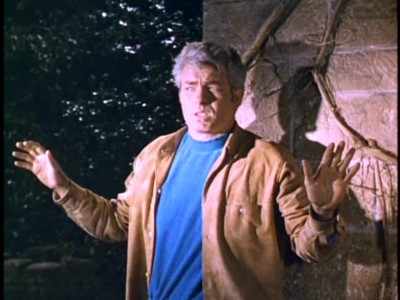
DISC THREE
Essay in Evil
Three apparent strangers turn up at the same hotel with one goal in mind, but McGill is there to intercept them. The situation unravels with it becomes clear that one of the men has his own private agenda.
The Girl Who Never Was
An ex-soldier promises an art dealer that he can obtain an original Botticelli, long thought lost. The would-be buyer, however, employs McGill to track down the painting directly, cutting out the middleman and endangering McGill's life in the process.
All That Glitters
McGill gets hired by an MP to investigate the disappearance of a 10-year-old boy. The man claims he's trying to help the boy's grandmother, but this is only the first of many deceptions McGill encounters on the case.
Dead Man's Shoes
An Englishman wounded during a shooting in Milan tries to make his way home. Newly assigned to the case, McGill races against the police, British and American intelligence, and an international crime ring to get to the man first.
DISC FOUR
Find the Lady
When a $300,000 necklace is stolen, McGill sets his sights on the 10 percent finder's fee offered by the insurance company. He collaborates with an old informer, but a deadly misstep may cost him more than his commission.
The Bridge
The son of an English lord keeps trying to kill himself in the same way that one of his friends died-by throwing himself off London's Albert Bridge. His father asks McGill to investigate what inspired the death wish.
The Man Who Stood Still
A Spanish anarchist just released from prison has pondered one question for the last 30 years: whether an old comrade's betrayal lost him his freedom. He recruits McGill to help him uncover the truth at last.
Burden of Proof
After working as an advisor to a Central American republic for 20 years, Englishman Henry Faversham is accused of embezzling half a million pesos in gold. He flees to London and hires McGill for protection-but it may be too late.
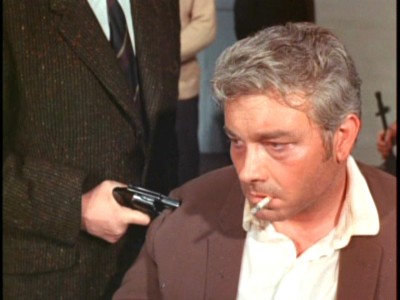
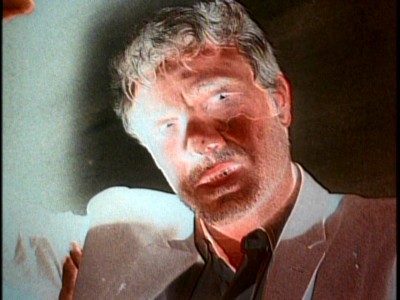
The DVD:
The Video:
The full-frame, 1.33:1 video transfers for the 35mm-shot Man in a Suitcase: Part 1 look reasonable, with okay color (the picture did often tend just toward the pinkish), fairly sharp picture and only minor defects like scratches or dirt.
The Audio:
The Dolby Digital English mono is perfectly acceptable, with a clear recording level and minimal hiss. No close-captions or subtitles, though.
The Extras:
Only some photo galleries with some behind-the-scenes and publicity photos on each disc. I understand that the Region 2 releases had illustrated booklets, commentaries with Bradford, and a doc; too bad Acorn doesn't indulge in those sorts of extras.
Final Thoughts:
Fascinating. Man in a Suitcase deserves its cult following, if only because it's such a strange exercise in Lew Grade calculation: a glossy internationally-minded action exercise...with an emotionally closed-off, downbeat, brutal lead turn as its anchor. Richard Bradford doesn't play like any other ITC hero, clashing nicely with the smooth production values. A winner right down the line...let's hope the last 15 episodes are equally entertaining. Had Acorn put just one Bradford commentary on this...I would have given it our highest rating here at DVDTalk. As it stands, though, I'm highly, highly recommending Man in a Suitcase: Set 1.
Paul Mavis is an internationally published film and television historian, a member of the Online Film Critics Society, and the author of The Espionage Filmography.


|
| Popular Reviews |
| Sponsored Links |
|
|
| Sponsored Links |
|
|
| Release List | Reviews | Shop | Newsletter | Forum | DVD Giveaways | Blu-Ray | Advertise |
|
Copyright 2024 DVDTalk.com All Rights Reserved. Legal Info, Privacy Policy, Terms of Use,
Manage Preferences,
Your Privacy Choices | |||||||













